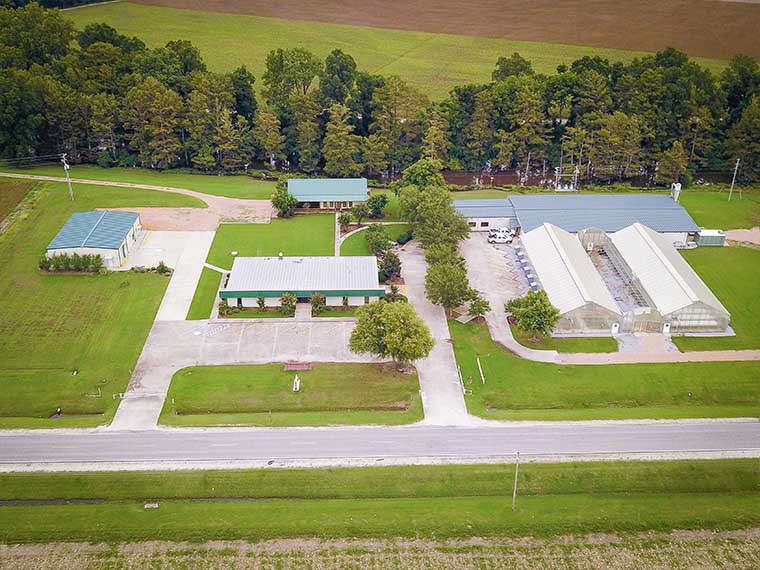DREC West Farm
By: Kenner Patton
The information presented on this page may be dated. It may refer to situations which have changed or people who are no longer affiliated with the university. It is archived as part of Mississippi State University's history.
The Delta Research and Extension Center was established in 1904 when a group of Delta farmers purchased "a worn-out old farm" and donated it to the state of Mississippi. These farmers had been experiencing consistent cotton yield declines, and they reached out to Mississippi State University for solutions. The original 200-acre plot of land, on the banks of Deer Creek, has expanded to currently encompass almost 5,000 acres. It is the largest of the Mississippi Agricultural and Forestry Experiment Station's 16 branch units and the largest land-grant agricultural research facility in the U.S.
DREC's mission is to conduct and disseminate comprehensive, current, and relevant agricultural research and share this information with the producers of the Mississippi Delta. This effort helps growers manage profitable and sustainable farms while maintaining safe and healthy homes and nurturing the state's natural resources and the environment.
In 2016, the Delta Research and Extension Center grew with the addition of the West Farm, formerly known as the Monsanto facility. After a series of mergers, the Monsanto Company (now Bayer) donated the property to the B. F. Smith Foundation, which in turn leased the property to MAFES. West Farm encompasses 135 acres and the 34,000 square foot building complex includes two rice breeding greenhouses, lab and office space, and two buildings for the new Mississippi River Valley Alluvial Aquifer Water Center.
The rice breeding program, led by Dr. Ed Redoña, helps local producers feed the world by developing long-grain rice varieties that produce high yields, and excellent physical, milling, cooking, and culinary qualities and are suited to the Mississippi climate. Other desirable attributes of Mississippi-developed rice varieties are tolerance to specific herbicides and non-biological characteristics such as heat stress, salinity, and damage caused by weather. Dr. Redoña's program also conducts the statewide Mississippi Rice Variety Trials and collaborates with other states to ensure superior adaptability, yield stability, and marketability.
The newly created Mississippi River Valley Alluvial Aquifer Water Center occupies the remainder of West Farm. These buildings have undergone extensive renovations and will be fully operational and occupied by the end of 2019. The concept of this center began in 2014 when farmers, researchers, government entities, and stakeholders identified a need to address water conservation in the Delta.
The joint venture between MAFES and USDA-ARS will address water management, agronomic practices, irrigation technologies, economic analysis and modeling, and hydrology.
Dr. Jeff Johnson, former head of the Delta Research and Extension Center, discussed the new facility's importance.
"The Lower Mississippi River Basin is one of the most productive and intensively irrigated agricultural regions in the nation, with over 90 percent of irrigation water pumped from the Mississippi River Valley Alluvial Aquifer," Johnson said. "The new water research center is designed to solve regional water problems by conducting research on water conservation and quality, in combination with farm profitability."
Faculty at the center include MSU and USDA-ARS scientists who will also collaborate with other universities and federal, state, and local agencies.
"The underlying philosophy of the Water Center aligns perfectly with Mississippi State's land-grant mission," Johnson said. "We are here to assist agricultural producers to help them remain profitable and have long-term sustainability. The Center brings specific emphasis to water issues that are apparent in our local communities, across our country, and in many cases, across the world. Through collaboration, scientists will seek to improve irrigation and crop-management systems that enhance soil health, water availability and quality, and crop productivity."
Dr. Jason Krutz, director of the Mississippi Water Resources Research Institute, is the interim director of the new water center. Prior to directing the institute, Krutz served as irrigation scientist and specialist at the Delta Research and Extension Center.
For more information about West Farm, contact Johnson at 662-686-3205 or by email at jeff.johnson@msstate.edu.

